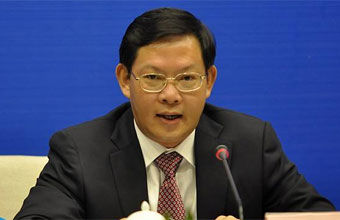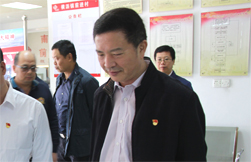Home> News
High-tech zone targets ASEAN investment
The zone had signed deals with 15 enterprises by the end of 2014, attracting total investment of 2 billion yuan ($322 million), and introduced another nine projects in the first five months of this year, adding investment of 4.4 billion yuan.
Seven of the first 15 enterprises were operational on June 8 and are expected to create total output value of 2.3 billion yuan annually.
Another seven are expected to be in operation by the end of this year and the remaining one next year. Construction of the nine new projects is also expected to start this year.
Zhanjiang Far East Steel Structure, a subsidiary of Baosteel Construction, started trial production in early June. Its first batch of high-end steel products, which weighs 1,000 metric tons and is worth 6 million yuan, will be exported to Indonesia in mid-July, said Chen Sheng, the company's general manager.
As a supporting enterprise for the Baosteel plant in Zhanjiang, the steel structure manufacturer was one of the first to enter the Fenyong high-tech zone.
It took only a little more than a year for the manufacturer to complete all construction and preparation for production after signing a deal with the zone's administrative committee in May 2014, thanks to the committee's highly efficient service.
The zone is also building a living compound to accommodate the staff of all businesses in the zone, which will ease the companies' financial burden, Chen said.
The general manager is optimistic about the steel plant's business prospects, eyeing annual output value of 1 billion yuan within three years, 60 percent of which is forecast to be from exports.
"The Belt and Road Initiative will bring large demand for steel structures, especially the high-end products, for the emerging economies in Southeast Asia," Chen said.
"There is no large-scale steel structure manufacturer within a radius of 300 kilometers. Through the Zhanjiang Port, we are able to cut the shipment distance to Southeast Asian countries by half, compared to our parent company in Shanghai."
Chen compares Zhanjiang to the next Zhuhai, a special economic zone in Guangdong. However, Zou, the director of Fenyong's administrative committee, said Zhanjiang is not copying any other city's development pattern but setting inspiring examples.
"Fenyong has made a miraculous transformation from a farm to a high-tech industrial zone, for which we couldn't find a precedent in China to follow," he said.
"The zone is developing at 'Fenyong speed' and I'm confident that by 2017, it will generate output value of 10 billion yuan and bring taxes of 300 million yuan every year."
To go full steam ahead, the Fenyong zone and Zhanjiang city still need preferential fiscal and tax policies to help them draw more investment, Zou added.
Contact the writer through xujingxi@chinadaily.com.cn

 Print
Print Mail
Mail 5G construction supports Zhanjiang's high-quality development
5G construction supports Zhanjiang's high-quality development
 Acting mayor inspects project construction in Xuwen, Leizhou
Acting mayor inspects project construction in Xuwen, Leizhou Zhanjiang island an "egret paradise"
Zhanjiang island an "egret paradise"  Dancing egrets add vitality to Xiashan
Dancing egrets add vitality to Xiashan